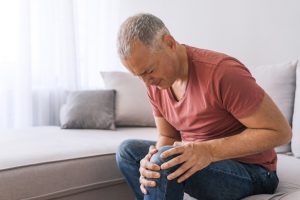
Osteoarthritis is the most common type of knee pain in adults over 50. By age 70, about 27 percent of adults have knee osteoarthritis. Some common symptoms include swelling, loss of mobility, stiffness and chronic pain.
Arthritis pain management has been the topic of much debate. Some physicians prescribe prescription opioids to manage the pain of arthritis, but new research suggests opioids may do more harm than good.
According to a new study published in Arthritis Research and Therapy, opioids may not be effective in reducing pain and disability associated with knee osteoarthritis. Instead, opioids can cause unwanted side effects such as dizziness, nausea, constipation, sleepiness and addiction.
Jannis Bodden, MD, of the University of California, San Francisco, conducted a four-year study on opioid use and changes in knee structure. Dr. Bodden and her colleagues found that, compared to non-opioid users, opioid users showed:
- Faster progression of arthritis
- More structural degeneration of the knee
- Worse quality of life
- Higher mortality rate
“Despite the use of opioids, baseline symptom and pain control were worse in opioid users compared to controls,” noted Dr. Bodden and colleagues. “Loss of [quality of life] was more rapid in opioid users, when adjusted for baseline pain scores, further questioning long-term opioid use, particularly in view of major adverse effects associated with this medication.”
Natural Ways to Manage Chronic Arthritis
Medication can be one component of pain management, but doctors often recommend natural treatments as well. These may include:
- Exercise — Physical activity can help you manage your weight, increase mobility and flexibility and strengthen muscles.
- Cold and heat therapy — Warm showers, saunas, heating pads, ice packs and cold compresses can help reduce pain and inflammation.
- Meditation and relaxation — Mindfulness can reduce stress and lower pain and inflammation.
- Healthy diet — A diet high in fruits, vegetables and whole grains can increase antioxidants, boost immunity and reduce inflammation.
Call Your Orthopedist to Manage Your Knee Pain
You don’t have to live with chronic pain. Your orthopedist can help you manage knee pain with a customized treatment plan. Knee, hip and joint surgeries are among some of the most common and successful procedures performed today, and your doctor can discuss several options to suit your needs. Call today to make an appointment.
